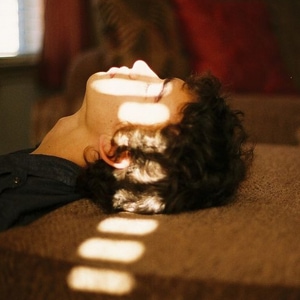Most of the time, the Chinese Market back parking lot empty and deserted. The entry is small, without a marker, off a restricted residential road, shield by low-hanging branches of willows. At most, there are some unloading trucks, a couple of cars parked crookedly or children bikes with broken brakes and spinning tires pointed up at the sky, the cheap colour drips down, staining the ground.
A rusted sign has been lying in the middle of the lot for months, bent and twisted like a poor limb, rain pitter-patter on the metal, on the wet asphalt, on the sad, narrow leaves that bow under the weight of the water.
Maisie Watson waits in the shadow of the eaves, the black of her skin melts as one to the darkness. Chatters and laughters carry from restaurants and upper balconies’ chimney along with the strong aroma of food, dissipate into the rushed air.
As opposed to the front of Chinese Market, where grand lanterns string across the sky, where bold colours underline the optimism and warm kitchen home, the backside reflects the drain-out energies and weary smiles the Chinese immigrants exchange each other as they scrabble for coins from day-to-day. The mucky smell stings one’s eyes. The wind only elevates the stink.
There is a low chain-link fence has been scaled by bushes and branches. If she squints hard enough at the screen of green leaves, she would see a hole, snapped wires curbed to form a circle big enough for an adult male to slip through. Beyond that opening is the infamous forever in-working construction site, a land that strew with syringe, plastic wrappers and cracked bottles, and cigarette butts, a ground that has been tampered by big and small, long and short sneakers’ prints.
There are corpses, too, Maisie Watson adds silently to the list, Lots of corpses. Corpses of animals, of humans, of inanimate things, of the buried and unburied, corpses of anything and everything.
The popular simile is that the Market is a replica of Shanghai in this far, remote corner of Western sea.
“And in Shanghai, Mai, you don’t know when you will die and you don’t know why did you die,” Doctor Vu has commented, once, not looking up from his splitted-spine book. His tough, knuckly thumbs and indexes, with black spots crammed deep in his nails, press the page in place. Fingers that perhaps have only been dirtied by the solutions he mixed.
She didn’t know how long had she been waiting under the rain, the only thing she knows is that as the seconds, quietly, ruthlessly trickle away, the brutal reality she’s about to do becomes bloodier and bloodier in her mind. The wind is blowing from the East, pressing her against the wall, whipping the corners of her jacket against her thighs. At this point, she cannot distinguish whether her shaking is from the cold or from anxiety bubbling from her belly. But no matter.
Tick-tick-tick-tick, she can hear her heart thrums in her chest, boom-boom-boom-boom.
From where she’s standing, she can catch a glimpse of the local Catholic school’s spires. The American flag waves weakly in the wind, clinging to the pole. Maisie Watson used to attend there, used to be amongst the remaining late students that linger in the library until the librarians forcefully kicked her out, used to watch crews of boys her age hit and dare each other to venture into the graveyard, their lanky shadows stretched and slanted like the tilt of their eyes.
Sometimes, the next morning, one of them would never come back to class. Cassidy didn’t. Jacob didn’t. Taylor didn’t.
Maisie Watson flutters her eyes shut, a trepidation slowly builds up from the base of her throat, like a scream. She wounds the plastic bag’s handle tighter around her fists, feeling the remaining blood seeps off her wrists, leaving the fingers cold.
She wonders if the dead boys have their eyeballs in place? Still have their body intact, organs tacked in place?
The school bell shrill whistles, cutting the rain like a death toll.
All at once, as if an hornet's nest breaks, a bumble of noises and excitement rises, sweeping across the earth like a wave. Parents’ cars roar alive as their children emerge. Metal doors fling open, producing hard snappy sounds, cheers and greeting and rainboots race across puddles-riddled ground.
The downpour lessens into a misty spray as the major mass of cloud glozes over. The pressure lifts, clearing her lungs. A fresh taste of after-rain, earthy and licorice, sweet and light. There’s no visible sunlight, but the surrounding clearly brightens, just enough to see the colours surge into the world again, bolden the edges, returning the rough, coarse textures.
Forms dash uphill, criss-crossing, voices shouting atop of each other. Colourful umbrellas bloom like wildflowers. A line of cars had already lined up on the streets, jamming at the narrow intersection, honking and fighting over every single inch. Children laughter vibrate her bones. They pass the Chinese market back parking lot entry, scrunching their nose at the reek of rotten garbages, some peer at her and points to the adults, but most hurry on their own way.
Maisie Watson toes a spot of clean cement in front of her, hunching her shoulders.
She thumbs the torn, damp paper inside her pocket, her past crime encircles her: a woman’s heart, a man’s liver, a mother’s tears, a grandpa’s feet, the list continues, coming in deliberate flashes that churns her stomach. Like a Polaroid shot, each photograph comes slow, the details emerge in black and white shapes before gaining colours. The captured moment surfaces, saturated and frayed at the edges, old, almost from a different lifetime, but as you hold the photo card in your hand, you can recall the seconds that lead up until the snap of the camera. How her muscles spasm as she ripped the blade through the victims’ flesh. A father’s index finger, a lover’s tongue. Maisie Watson casually rummages through her handbag, curling her fingers around the syringe and knife, using her wide sleeves to hide them from sight behind her leg.
I had do this plentiful enough, Maisie Watson tells herself, Doctor Vu trusts me. Her plan will work. Have to. Must. She cannot let Doctor Vu down.
Her other fist unconsciously clench and unclench. She scans her surrounding one more time, waiting, waiting, mouth dry.
There are smaller trickle of people on the street, most of the time the older students that stayed behind to complete some works. The upperclassmen are easily recognizable from their square, tense jaws, stylish hair and their neglecting an umbrella. They are all walking far apart of each other, either plugging their head down in their phone or humming to the music leaking from their earbuds. Their steps are quick, curt, already bear the urgency-sense of college students.
That’s the thing about West Bass River. It’s a typical small town puzzle where everyone yearns to get out, desperate to get miles and miles away from this ungodly place, yet knowing their fate is bond to the land. They borned here, they die here.
Maisie Watson snaps to attention when she spots a gang turn around the corner, strolling down the street, whooping and shoving each other. They’re passing around a basketball, the leading kid is riding a tricycle, though his knees are pointing upward in a painful poise and his back curves so far it’s almost a complete circle. The bland light blurs their faces. She’s momentarily transported back to the evenings of her school years, as she was peering at the distance, making sure the number of boys coming through the hole is the same as the number of boys coming out.
Traditions never change, around here. The boys still meet here, baptized this ground as their holy land.
Perhaps, somewhere, there is also a girl that is overwatching these daredevils’ safety.
Maisie Watson casually moves across the opening once the gang has gotten close enough. She makes sure to turn and lock eyes with one of them before lifting the green leaves’ screen and duck through the hole, letting the curtain falls behind.
The construction site doesn’t change much from the last time she was here. The cranes are rusted brown, dangling above. Some half-hearted skeleton of the house, with the concrete base already filled and wiped smooth, filled with some water and leaves from the rain earlier. The woods rotting away. A trolley still loaded with bricks. It almost was like the building crew was just going on a short lunch break and will be back soon, if not for the wild green that climbed and braided around the structures. The hook creaks at every soft breeze, and the cables look are ragged from exposing to the elements, looking like it might snap any second.
The fine mist continues to dapple.
Footsteps scrunch on the broken gravel and hushed loud voices on the other side of the fence. She quickly makes her way around the house hull, disappearing behind a board, where round, empty cylinders stack onto each other. Without glancing back, she knows the kids would be shifting from foot to foot, eyebrows raising at each other, the unquestionable question transmits through the air: Who will go in first? Who will go in to call that crazy lady out?
She silently presses the trepidation off her thought, tightens her grip on her knife. The silver needle of the syringe trembles. She puts plastic bag down alongside with her handbag and unzips her coat and rolls up her wide sleeves, the cacophonous sound makes her cringes inward.
“Hello, Miss?” A voice calls, wavering, as if he can’t decide to be serious or to maintain a jab of playfulness.
Maisie Watson doesn’t reply. She closes her eyes, leans back on her heels and inhales sharply. The scene pans out in her head, perfectly, down to every details. And she clings to the ideal vision with all her might. Yes, she would only grab one boy, cleanly numbs him out, dig out his eye, then cut his throat, and begone. Just like that. A minute, or maybe less.
She hears scuffles and hisses, and she knows the time is close.
Her palms are sweaty and grainy, and there is an odd toe-curling sense that drums through her body. She can feel the boy’s solid, soft body in her arms, the thickness of his blood is palpable between her fingers.
“Fuck it, you wimps,” A strong, deeper voice cuts in, shushes out the arguing. “I’ll do it myself.”
“Aras, we should all go in there, OK? She might be one of those stoned nutcases. Fuck, for all we know, she might be with those nutcases holing up in there.”
“Roche, we ain’t escorting a princess.”
“I agree with Rookie. If we get beat up, we get beat up together.” Another boy piques.
The deeper-voice barks out a laugh, although his care betrays through his sarcastic words. “The last time you guys all peed your pants while I had my face decorated.”
“C’mon man,” The Roche kid starts.
“It takes only a sec. Don’t worry, I’ve long legs.” A few pattings, here and there.
Then a harsh ruffle of the leaves get parted. She can physically feel the boy’s presence, as if they are in a room. He’s the type that takes up a whole lot of space anywhere he goes, the type that sucks all the air out of the atmosphere, the elephant in the room.
Aras hesitates at first, but quickly gains confidence.
“Miss, we don’t mean any harm, but you shouldn’t be here. It’s dangerous.”
Maisie Watson remains quiet at first, her mind spins slowly. “You shouldn’t be here either.” She says softly, under her breath.
“Did you say something?” His soles turn, causing the rocks to grind. He seems to consider something for a moment before cautiously approaches her direction.
Maisie Watson raises the needle and braces herself.












Comments (0)
See all